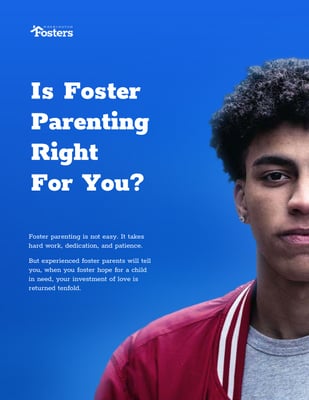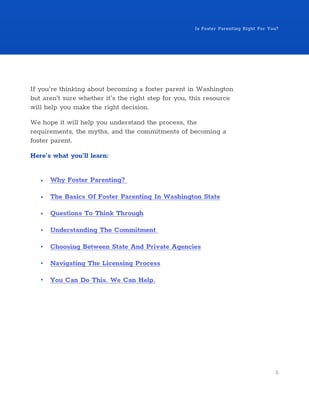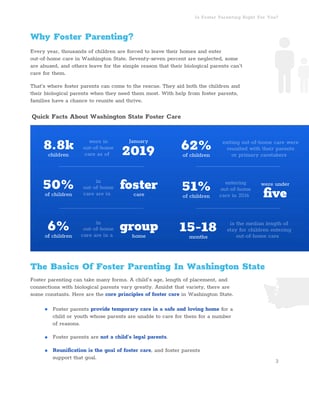Imagine being a parent, sitting on a couch across from a stranger who's watching your child because you're not able to. You'd likely feel uncomfortable, maybe embarrassed, even defensive. But this is the only time you get to see your kids all week, so you try and make the most of it.
Now put yourself in the shoes of a foster parent. You've taken in a child whose parents may have neglected or abused them. Everything you've heard and read about the parents is negative. But you're required to attend this weekly meeting so they can see their child.
Family visits, called “family time” in Washington State, are regularly scheduled opportunities for foster parents, children, caregivers, and parents to get together. Typical family time lasts two hours and happens twice a week. It's not a lot of time, but it's a critical opportunity for foster parents, biological parents, and children to connect.
Download Now: Is Foster Parenting Right For You?
Family time keeps parents engaged and focused on the welfare of their children while they work to mitigate whatever factors brought their child into care. It creates a space where biological parents and foster parents can share information, and it offers a chance for both sides to alleviate fears they have about each other.
Foster parents can struggle with family time because they've usually only heard bad things about a child's biological parents. When foster parents understand the importance of family time and have empathy for parents, they transform the experience from one that's scary into one that's positive for everyone involved.
Collaborate And Communicate With Parents

Communication with a child's biological parents goes a long way to reduce the potential friction of family time. All too often, both sides arrive unsure of what to expect, and that confusion can lead to irritation.
For example, a baby entering care arrives at a scheduled family time, and their biological parents don't bring diapers to the meeting. Foster parents may feel frustrated by such misunderstandings or think it's a sign of the parents' inability to care for the child. In reality, the biological parents simply didn't know it was their responsibility.
Collaborating with a child's parents ensures everyone is on the same page and bridges the gap in communication that can happen when both sides rely on overloaded caseworkers to fill them in.
Before family time, make an effort to reach out to the child's parents and come up with a plan for the meeting. Decide on who can bring a favorite toy or a special snack. Figure out who is bringing diapers or other appropriate supplies. Chat about recent behaviors or events in the child's life that you'd like to discuss when you meet.
When you collaborate and communicate with a child's parents, you foster meaningful relationships based on something more than case files. You'll see them as concerned parents, making an effort to do what's best for their child, even if they can't provide it themselves.
Click here to find additional resources to help you start a relationship with birth parents.
Reframe Your Expectations

It's easy to convince yourself that a child's biological parents are bad. If you go into a meeting expecting the worst, chances are, you'll find ways to confirm your beliefs. But that sort of thinking doesn't benefit you, the child, or their parents.
Reframing your expectations of family time is a powerful way to overcome negative beliefs and foster better connections with a child's parents.
For example, a child may leave family time and start acting out. They may seem distraught, reserved, or depressed. Foster parents with negative expectations might think, The visit must have been so horrible. Seeing their parents was so traumatic that the kid is now acting out this way.
But the reality is that the child is distraught because they're now separated from their parents all over again.
Think about how hard it must be for the child and their parents to be reunited and then separated multiple times a week. Base your expectations on empathy and look for ways to make family time a smoother experience for everyone involved.
Thinking about becoming a foster parent, but not sure if right now is the right time for you? Download our free guide, Is Foster Parenting Right For You?







